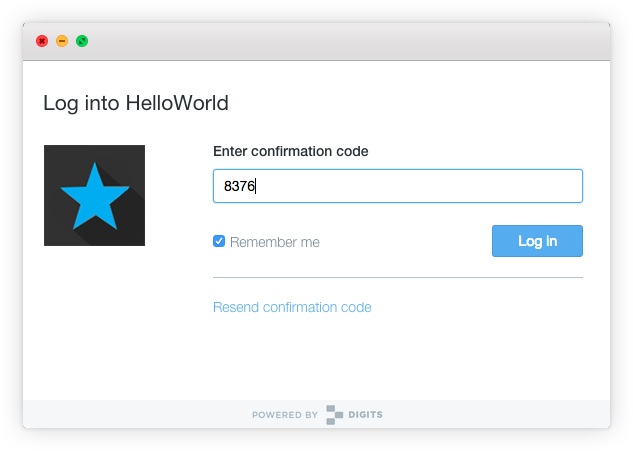Twitter releases Digits login for web

Twitter has released a developer kit that allows makers of mobile apps with companion websites to use its Digits phone number login platform, rather than traditional passwords for website login authentication.
The social media network announced the release of the Digits offering in October 2014, as a white-label product. It enables mobile app developers to plug in a single line of code in order to allow their users to log in to the app using their phone numbers rather than a password.
Digits is Twitter's version of two-factor authentication, and employs an app user's phone number along with a four-digit confirmation code. It was released globally for iOS, Android, and mobile web on October 22, 2014, as part of the company's "Fabric" mobile app development framework.
Now, with Digits login for web, developers can implement the phone number-based login on an app's companion website with just a few lines of code. However, app users still have to first sign up through an app as usual prior to logging in to its website.
When users log in on the web for the first time, they first receive a confirmation code via SMS on their phones, which they need to type into the same browser window to complete the process.

Once a user has been successfully authenticated via a website powered by Digits, the platform will omit an SMS confirmation the next time that user logs in to any other sites that are also powered by Digits -- a functionality that Twitter says will help drive user engagement online.
"Passwords or other extra steps in the login process may reduce your website's conversion rate," said the company in a blog post. "Digits login for web gives your users a powerful, single login experience that also increases the conversion rate for your logins.
"Not only can Digits help you drive more downloads for your app, it also enables you to bring your mobile service onto the web -- ensuring a consistent identity experience across platforms," it said.
The offering comes as another messaging powerhouse, WhatsApp, releases a web client version of its popular mobile app, which now has around 600 million users.
At present, however, users can only get to the instant messaging service's web version if they are using Google's Chrome browser, and it cannot be accessed by users who do not have WhatsApp installed on anything other than an iOS device.
Meanwhile, researchers from the University of Melbourne in Australia and the University of Pennsylvania in the United States have been using Twitter, which claims 284 million monthly active users, to predict rates of heart disease.
In a study published in the Psychological Science journal, the researchers showed that the social media platform can serve as a dashboard indicator of a community's psychological well-being, as well as predicting rates of heart disease.
While prior studies have identified a number of factors that can lead to heightened risks of heart disease, such as smoking and low income, the researchers demonstrated that Twitter could capture more information about heart disease risk than many traditional factors combined.
The research team drew upon a set of public tweets made between 2009 and 2010, and used established emotional dictionaries, as well as automatically generated clusters of words reflecting behaviours and attitudes, to analyse a random sample of tweets from individuals who had made their locations available.
There were tweets and health data from about 1,300 counties, which contain 88 percent of the United States' population.
The researchers found that expressions of negative emotions such as anger, stress, and fatigue in a county's tweets were associated with higher heart disease risk. On the other hand, positive emotions like excitement and optimism were associated with lower risk.
"The relationship between language and mortality is particularly surprising, since the people tweeting angry words and topics are in general not the ones dying of heart disease," said assistant professor H Andrew Schwarz. "But that means if many of your neighbours are angry, you are more likely to die of heart disease."